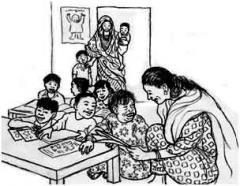Your progress
0%
complete
While non-formal education is often considered a second-best option compared with formal education, it should be noted that it can provide higher-quality education than that available in formal schools. Non-formal education can be preparatory, supplementary or an excellent alternative (where necessary) to formal schooling for all children.
Learn about how a programme in Bangladesh created opportunities for fun and flexible learning.


The Bangladesh Rural Advancement Committee (BRAC) operates over 50,000 pre-non-formal and non-formal schools throughout Bangladesh, serving more than 1.5 million children. The schools are usually one-roomed bamboo or mud houses and are located within a one-kilometre radius of the students’ homes. They are usually run at a time convenient for the students; some schools start as early as 6 a.m. and operate in two shifts.
Since 2003, BRAC schools have been run with an underlying inclusive philosophy: “Inclusion is an approach which addresses the needs of all learners in ordinary classroom situations, including learners with special needs, indigenous children, children with disabilities, girl children and poor children”. BRAC schools have flexible schedules that ensure compatibility with rural life. Teachers are recruited locally and the community is involved in developing timetables, choosing the site for the school and providing labour and materials to build the classrooms. Teaching methods are learner-centred and participatory, using music, dance, art, games and storytelling. Some of the schools are for children who have never attended formal schooling, and others focus on children who have dropped out.
Children return to formal schooling once they have completed courses in BRAC schools. Specialist disability non-governmental organizations and the government assisted BRAC to remove barriers to inclusion by making schools accessible. They helped to make the whole environment “disability friendly”, providing: